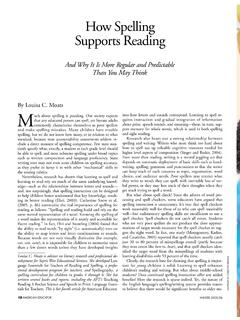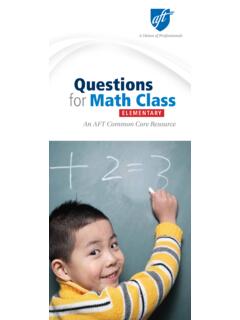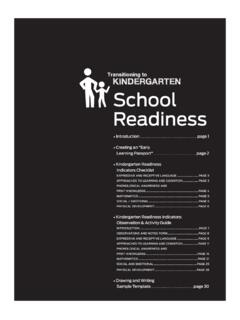Transcription of ASk the CogNItIve SCIeNtISt What Will Improve a Student’s ...
1 Ask the CogNItIve SCIeNtISt What Will Improve a Student's Memory? How does the mind work and especially how does it learn? on the test. I've found that these students typically know little Teachers' instructional decisions are based on a mix of theories about how their memories work and, as a result, do not know learned in teacher education, trial and error, craft knowledge, and how to study effectively. gut instinct. Such gut knowledge often serves us well, but is there In this article, I'll discuss what to tell your students about how anything sturdier to rely on? memory works: how to commit things to memory, to avoid forget- CogNItIve science is an interdisciplinary field of researchers ting, and to know when they've studied enough.
2 I'll provide from psychology, neuroscience, linguistics, philosophy, computer examples for classroom demonstrations to make the abstract science, and anthropology who seek to understand the mind. In ideas more vivid for your students, and I'll describe how they can this regular American Educator column, we consider findings apply those abstract ideas when they study. from this field that are strong and clear enough to merit classroom F. * * *. application. rom the time a child enters school until she earns a diploma, her principal task is to learn new facts and By Daniel T. Willingham skills. It would seem natural, therefore, that somewhere along the way (perhaps around sixth grade or so, when Question: I often have students tell me that they studied for a schoolwork really becomes demanding) she would be told test, meaning that they reviewed their notes and the textbook, illustrated by serge bloch but they still did not do well.
3 If they have reviewed the material, Daniel T. Willingham is professor of CogNItIve psychology at the Uni- why don't they remember it? Is there anything I can do to help versity of Virginia. His new book, Why Don't Students Like School?, them study more effectively? will be available in spring 2009. For his articles on education, go to Readers can pose specific questions to Ask the CogNItIve SCIeNtISt , American Educator, 555 New Jersey Ave. Answer: Many of my students also tell me that they reviewed , Washington, DC 20001, or to Future columns their notes and were quite surprised when they did not do well will try to address readers' questions. AMERICAN EDUCATOR | WINTER 2008-2009 17. something about how her memory works and something about ing dog will bite, and so on).
4 Each of these thoughts will lead to how to make it work better. But that rarely happens. In fact, most different memories of the event the next day. If you think about college students report that they have improvised their own sys- the sound of the dog's bark, the next day you'll probably remem- tems of In this article, I will describe three principles of ber that quite well, but not its Now, suppose that memory that are relevant to most of the learning that students when you saw the barking dog, you thought mostly about what do in elementary and secondary school (and, for that matter, a nuisance the noise must be to the neighbors. If, the next day, I. most of the learning that adults need to do too). The three prin- asked, Did you see anything on your walk that could bite?
5 You ciples I'll describe apply equally to all sorts of learning from might well say, No, I don't think I did. 4 To put this example into memorizing new vocabulary words, to reading a novel so as to broader terms, even simple concepts have multiple aspects of prepare for a class discussion the next day on its plot and style, meaning; which one of these you think about will determine to conducting a chemistry lab in the morning in order to com- what you remember. pare the outcome with examples in a problem set to be handed Thus, the first principle for students is that memories are out that afternoon. formed as the residue of thought. You remember what you think Memory is a vast topic of study, and much is known about it.
6 About, but not every fleeting thought only those matters to Let's take the broad question, what will Improve a student's which you really devote some attention. memory?, and break it into three more manageable parts: (1) I'll discuss what this principle means for the classroom in How can I commit things to memory? (2) How can I avoid forget- more detail below, but it's worth pausing now to note an impor- ting the things I have committed to memory? (3) How can I be tant implication. It is vital to know what you're going to want to certain that I have actually committed to memory the things I remember later, because that dictates how you should think want to know? I will take up each of these questions in turn.
7 About the material. Most of the time, teachers want students to Then, we'll apply what we've learned to the classroom. know what things mean. Thus, the advice offered to students should center on ways to help them think about meaning and How Can I Commit avoid study methods that do not encourage them to think about Things to Memory? meaning. Some of what we experience day to day is stored away in our minds for future reference, but much of it is not. For example, you How Can I Avoid Forgetting the might describe in vivid detail the interior of a quaint ice cream Things I Have Committed to Memory? parlor you visited last summer, but be unable to recall what flavor In my experience, people usually believe that forgetting happens ice cream you had.
8 Why would your memory system hold on to over time; if you don't use a memory, you lose it. That may be a part of that experience the parlor and discard another the factor in forgetting, but it's probably not a major one. This may flavor? The short answer is that you remember the part that you be hard to believe, but sometimes the memory isn't gone it's thought about. just hard to get to. So, more important than the passage of time One of the interesting features of your memory system is that or disuse is the quality of the cues you have to get to the memory. you don't control what is stored. Wanting to remember some- Cues are bits of information that are the starting point for retriev- thing doesn't have much bearing on whether or not you will ing a memory.
9 The good news is that the right cue can bring back actually remember Indeed, when you think about it, most of a memory that you thought was lost. For example, you might what you remember is not stuff that you consciously tried to believe that you remember very little of your childhood home, store. Your knowledge of current events, of movie plots, of your but when you visit as an adult, the sight of the house acts as a cue friends' latest doings you didn't try to commit any of that to that brings memories flooding back. Or you may think that you memory. What you did do was think about those things. And have forgotten all of your high school Spanish, but a few days of here's how you should think about memory: it's the residue of constant exposure to Spanish when you visit Mexico leaves you thought, meaning that the more you think about something, the understanding much more than you expected.
10 More likely it is that you'll remember it later. A poor cue, in contrast, will not get you access to a memory, But wait, before you think about that so much that you com- even if you know that the memory is in the system. For example, mit it to memory, let me clarify one point. It's only the most suppose that I say to a friend, Here's the $20 I owe you, where- salient bit the part you really think about that turns into a upon he says, You don't owe me $20. A better cue would offer memory. Back in that ice cream parlor, while you were selecting more information, like this: Remember, we were at Macy's and your ice cream and then eating it, you certainly devoted some I wanted to buy that shirt but their computer wouldn't take my thought to the flavor.














